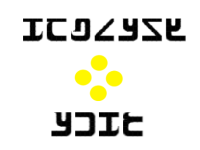Lingo De Yigo: Difference between revisions
Appearance
No edit summary |
No edit summary |
||
| Line 10: | Line 10: | ||
== Phonology == | == Phonology == | ||
=== Consonants === | |||
{| class="wikitable" |} | {| class="wikitable" |} | ||
| Line 27: | Line 29: | ||
*/w/ is only pronounced in diphthongs beginning with /u/; for example, esuiso=/ɛzwizɔ/. | */w/ is only pronounced in diphthongs beginning with /u/; for example, esuiso=/ɛzwizɔ/. | ||
=== Vowels === | |||
{| class="wikitable" |} | {| class="wikitable" |} | ||
Latest revision as of 18:38, 11 July 2025
Overview
The language Lingo De Yigo, spelt alternatively as Lingo de Jigo or Lingo de Igo, is a Nezo-Romance language spoken in the islands of Yigó. The language utilizes a three-gender system, contrasting with the two-gender system other Romance languages use.
Phonology
Consonants
| Bilabial/Labio-Dental | Alveolar | Palatal | Velar | |
| Plosive | p, b | t̪~t, d̪~d | k (c), g | |
| Fricative | ɸ~f, β~v | s | ||
| Nasal | m | n | ||
| Liquid | (w) | l | j (y or j) | w* |
| Flap | ɾ (r) |
*/w/ is only pronounced in diphthongs beginning with /u/; for example, esuiso=/ɛzwizɔ/.
Vowels
| Front | Back | |
| Close | i | u |
| Mid-Open | ɛ (e) | ɔ (o) |
| Open | a |
Grammar
Lingo De Yigo's grammar includes roots that can take different suffixes to invoke meaning. For example:
| Root | manducr- (eat) |
| +-o | manducro "food" |
| +-ero | manducrero "eater" |
| +-i | manducri "I eat" |
| +-uiso | manducruiso "Eat. (imp.)" |
| +van- | vamanducri "I will eat" |
| +ven- | vemanducri "I ate" |
| +-ulo | manducrulo "small amount of food/light snack" |
| +-ono | manducrono "large amount of food/feast" |
Pronouns
Lingo De Yigo has three cases for pronouns: Nominative, Accusative, and Genitive.
| Nominative | Accusative | Genitive | |
|---|---|---|---|
| Singular 1st person | ie/ye/je | me | mi |
| Plural 1st person | ies | mes | mis |
| Singular 2nd person | tu | te | ti |
| Plural 2nd person | tus | tes | tis |
| Singular 3rd person | lo, le, la | lo, le, la | lo, le, la |
| Plural 3rd person | los, les, las | los, les, las | los, les, las |
Yéshvwae Loanwords
Due to the speakers' proximities, Lingo De Yigo has borrowed a few loanwords from Yéshvwae. One example is the word for "king/queen", "golayam(o,e,a)" (from Yéshvwae golayáeme).
